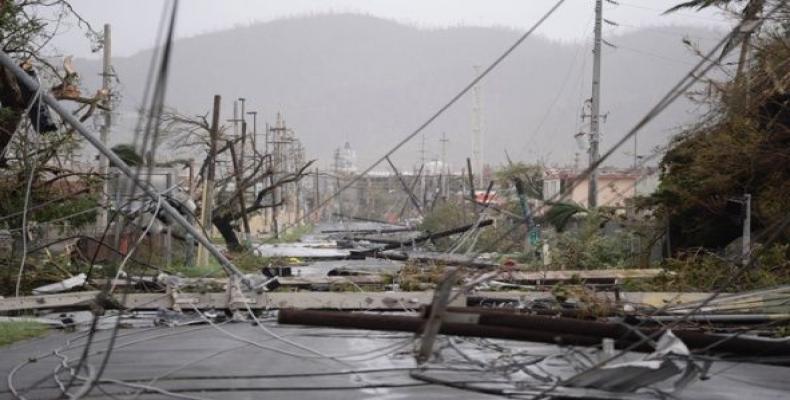San Juan, September 25 (RHC)-- In Puerto Rico, 100 percent of the island is still without power after the passage of Hurricane Maria. In the northwest corner of the island, 70,000 people have been ordered to evacuate the areas around the Guajataca Dam, which was damaged by Hurricane Maria and is at risk of collapsing "at any minute."
Over the weekend, leaders and representatives from more than 50 municipalities gathered in the capital of San Juan to relay tales of the damage, which was so severe that government officials had still not heard from an additional 20 mayors.
At least 10 people in Puerto Rico are dead, a number likely to rise as more reports come in. In addition to the flooded roads, deprivation of basic services and island-wide collapse of the economy, the mayors reported, residents cannot even acquire food or water and looting has begun in some areas.
Latin-American journalist Julio Ricardo Varela tweeted a message from a friend on Puerto Rico which compared the damage to an “atomic blast,” writing that local residents were reporting they had seen “total devastation, not one electric pole standing, no traffic lights, cars upside down, flooding, landslides, houses and apartment buildings without roofs, windows; large debris everywhere, people walking like zombies, not a single tree with leaves on them, just sticks.”
Reports say that it could take weeks or even months to restore power throughout the entire island, in part because the Puerto Rico Electric Power Authority has been bankrupt since July.
Coupled with two other devastating hurricanes, Harvey and Irma, 2017's hurricane season is the worst in modern records, the Washington Post reported. Some high-ranking officials like Environmental Protection Agency chief Scott Pruitt have been doing their best to deflect question about whether the storms are related to climate change, but scientists say they likely are, even if the phenomenon is not yet intricately understood.
While bad hurricane seasons would happen whether or not the climate is changing, mountains of evidence suggest warming ocean temperatures make intense storms more common, and rising sea levels contribute to devastating storm surges during hurricanes.


